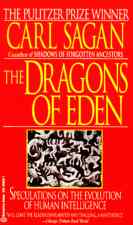
Dragons of Eden

Description
by Carl Sagan
The Dragons of Eden :
Speculations on the Evolution of Human Intelligence
by Carl Sagan
Dr. Carl Sagan takes us on a great reading adventure, offering his vivid and startling insight into the brain of man and beast, the origin of human intelligence, the function of our most haunting legends--and their amazing links to recent discoveries.
"How can I persuade every intelligent person to read this important and elegant book?... He talks about all kinds of things: the why of the pain of human childbirth... the reasons for sleeping and dreaming... chimpanzees taught to communicated in deaf and dumb language...the definition of death... cloning... computers... intelligent life on other planets... Fascinating... Delightful." - The Boston Globe
"A history of the human brain from the big bang, fifteen billion years ago, to the day before yesterday...It's a delight." The New York Times
"In some lost Eden where dragons ruled, the foundations of our intelligence were laid... Carl Sagan takes us on a guided tour of that lost land... Fascinating... Entertaining... Masterful." - St. Louis Post-Dispatch
Excerpt:
Page 136-137
There are, it seems, three principal states of mind in human beings: waking, sleeping and dreaming. An electroencephalograph, which detects brain waves, records quite distinct patterns of electrical activity in the brain during these three states.* Brain waves represent very small currents and voltages produced by the electrical circuitry of the brain. Typical strengths of such brain-wave signals are measured in microvolts. Typical frequencies are between 1 and about 20 Hertz (or cycles per second) - less than the familiar 60 cycles per second frequency of alternating currents in electrical outlets in North America.
But what is sleep good for? There is no doubt that if we stay up too long the body generates neurochemicals that literally force us to go to sleep. Sleep-deprived animals generate such molecules in their cerebrospinal fluid, and the cerebrospinal fluid of sleep-deprived animals induces sleep when injected into other animals who are perfectly wide awake. There must, then, be a very powerful reason for sleep. 
The conventional answer of physiology and folk medicine alike is that sleep has a restorative effect; it is an opportunity of the body to9 perform mental and physical housekeeping away from the needs of daily living. But the actual evidence for this view, apart from its common-sense plausibility, seems to be sparse. Furthermore, there are some worrisome aspects about the contention. For example, an animal is exceptionally vulnerable when sleeping. Granted that most animals sleep in nests, caves, holes in trees or logs or otherwise recessed or camouflaged locations. Even so, their helplessness while asleep remains high. Our nocturnal vulnerability is very evident; the Greeks recognized Morpheus and Thanatos, the gods of sleep and death, as brothers.
Unless there is some exceptionally strong biological necessity for sleep, natural selection would have evolved beasts that sleep not. While there are some animals - the two-toed sloth, the armadillo, the opossum, and the bat - that, at least in states of seasonal torpor, sleep nineteen and twenty hours a day, there are others - the common shrew and Dall's porpoise - that are said to sleep very little. There are also human beings who require only one to three hours of sleep a night. They take second and third jobs, putter around at night while their spouses sink into exhaustion, and otherwise seem to lead full, alert and constructive lives. Family histories suggest that these predispositions are hereditary. In one case, both a man and his little daughter are afflicted with this blessing or curse, much to the groggy consternation of his wife, who has since divorced him for a novel incompatibility. He retained custody of the daughter. Such examples suggest that the hypothesis of the recuperative function of sleep is at best not the whole story.
271pp., Mass Market Paperback













